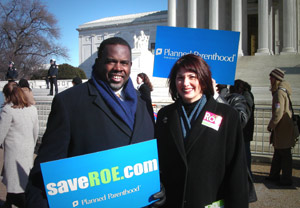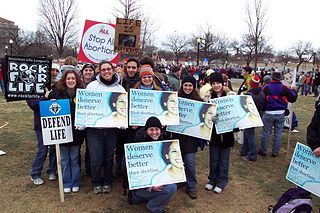
The United States abortion-rights movement is a sociopolitical movement in the United States supporting the view that a woman should have the legal right to an elective abortion, meaning the right to terminate her pregnancy, and is part of a broader global abortion-rights movement. The movement consists of a variety of organizations, with no single centralized decision-making body.
The Planned Parenthood Federation of America, Inc. (PPFA), or simply Planned Parenthood, is a 501(c)(3) nonprofit organization that provides reproductive and sexual healthcare, and sexual education in the United States and globally. It is a member of the International Planned Parenthood Federation (IPPF).
An abortion clinic or abortion provider is a medical facility that provides abortions. Such clinics may be public medical centers, private medical practices or nonprofit organizations such as Planned Parenthood.
Anti-abortion violence is violence committed against individuals and organizations that perform abortions or provide abortion counseling. Incidents of violence have included destruction of property, including vandalism; crimes against people, including kidnapping, stalking, assault, attempted murder, and murder; and crimes affecting both people and property, as well as arson and terrorism, such as bombings.

The United States anti-abortion movement contains elements opposing induced abortion on both moral and religious grounds and supports its legal prohibition or restriction. Advocates generally argue that human life begins at conception and that the human zygote, embryo or fetus is a person and therefore has a right to life. The anti-abortion movement includes a variety of organizations, with no single centralized decision-making body. There are diverse arguments and rationales for the anti-abortion stance. Some anti-abortion activists allow for some permissible abortions, including therapeutic abortions, in exceptional circumstances such as incest, rape, severe fetal defects, or when the woman's health is at risk.
The Pro-Life Action League is an American anti-abortion organization founded by Joseph M. Scheidler in Chicago in 1980. The organization's sole mission is to end abortion. Joe Scheidler was the national director, his son, Eric Scheidler, is the executive director, and his wife, Ann Scheidler, is the vice-president of the organization.

Lila Grace Rose is an American anti-abortion activist who is the founder and president of the anti-abortion organization Live Action. She has conducted undercover, investigative exposés of abortion facilities in the United States, including affiliates of Planned Parenthood Federation of America.

Abby Johnson is an American anti-abortion activist who previously worked at Planned Parenthood as a clinic director, but resigned in October 2009. She states that she resigned after watching an abortion on ultrasound. The veracity of her account and the details and motivation for her conversion have been challenged by investigative reporters, as medical records contradict some of her claims.

Anti-abortion movements, also self-styled as pro-life or abolitionistmovements, are involved in the abortion debate advocating against the practice of abortion and its legality. Many anti-abortion movements began as countermovements in response to the legalization of elective abortions.
Students for Life of Illinois is a 501c3 non-profit organization that was founded in 2006. The organization's purpose is to train collegiate anti-abortion leaders in the state of Illinois. It is not affiliated with the national organization Students for Life of America.

Unplanned is a 2019 American drama film written and directed by Cary Solomon and Chuck Konzelman. It is based on the disputed 2011 memoir Unplanned by anti-abortion activist Abby Johnson. The film stars Ashley Bratcher as Johnson, following her life as a clinic director for Planned Parenthood and her subsequent transition to anti-abortion activism.
Abortion in Alabama is illegal. Under section 26-23H-4 of the Code of Alabama in the U.S. state of Alabama, it is unlawful for an abortion to be performed unless it is deemed absolutely necessary in order to prevent a serious health risk to the pregnant woman. There are no exceptions for rape or incest.
Abortion in Illinois is legal. Laws about abortion dated to the early 1800s in Illinois; the first criminal penalties related to abortion were imposed in 1827, and abortion itself became illegal in 1867. As hospitals set up barriers in the 1950s, the number of therapeutic abortions declined. Following Roe v. Wade in 1973, Illinois passed a number of restrictions on abortion, many of which have subsequently been repealed. Illinois updated its existing abortion laws in June 2019. The state has seen a decline in the number of abortion clinics over the years, going from 58 in 1982 to 47 in 1992 to 24 in 2014.
Abortion in Alaska is legal at all stages of pregnancy, as long as a licensed physician performs the procedure. As of 2016, Alaska does not require a minor to notify a parent or guardian in order to obtain an abortion. 63% of adults said in a poll by the Pew Research Center that abortion should be legal in all or most cases. Alaska was one of only four states to make abortion legal between 1967 and 1970, a few years before the US Supreme Court's decision in 1973's Roe v. Wade ruling. Alaska had consent requirements for women seeking abortions by 2007 that required abortion providers to warn patients of a link between abortion and breast cancer despite it being scientifically unsupported.
Abortion in Arizona is currently legal for up to 15 weeks gestation.
Abortion in Delaware is legal up to the point of fetal viability. 55% of adults said in a poll by the Pew Research Center that abortion should be legal and 38% stated it should be illegal in all or most cases. There was a therapeutic exceptions in the state's legislative ban on abortions by 1900. Informed consent laws were on the books by 2007. In 2017, Senator Bryan Townsend, D-Newark introduced legislation to try to make clear that abortion would remain legal in the state in case 1973's Roe v. Wade ruling was overturned. The legislation was subsequently updated. Attempts have been made to introduce mandatory ultrasound laws, but they failed to get out of committee. State legislators tried to move ahead the week at which a woman could get a legal abortion in 2019.
Abortion in the District of Columbia is legal at all stages of pregnancy. In 1971, in United States v. Vuitch, the U.S. Supreme Court upheld a law saying abortion was allowed for health reasons, which include "psychological and physical well-being". Consequently, the District of Columbia became a destination for women seeking abortions starting that year.
Abortion in California is legal up to the point of fetal viability. An abortion ban was in place by 1900, and by 1950, it was a criminal offense for a woman to have an abortion. In 1962, the American Law Institute published their model penal code as it applied to abortions, with three circumstances where they believed a physician could justifiably perform an abortion, and California adopted a version of this code. In 2002, California passed a law guaranteeing women the right to have an abortion "prior to viability of the fetus, or when the abortion is necessary to protect the life or health of the woman." In 2022, California voters overwhelmingly approved Proposition 1, which amended the Constitution of California to explicitly protect the right to abortion and contraception by a margin of 33.76%.
Abortion in Florida is currently legal until the 15th week of gestation under legislation signed by Governor Ron DeSantis. Since 1989, the Florida Supreme Court has held that Article 1, Section 23 of the Florida Constitution protects access to abortion. This means that, despite the United States Supreme Court's decision in Dobbs v. Jackson Women's Health Organization, abortion remains legal in Florida. However, on April 13, 2023, the Florida Legislature passed and Governor DeSantis signed into law the Heartbeat Protection Act, which outlaws abortion after 6 weeks, with exceptions for rape, incest, human trafficking, a diagnosis of a fatal fetal abnormality, and when required to save the pregnant woman's life or protect her health. The Act takes effect if the state Supreme Court upholds the 15-week ban, currently being challenged.





